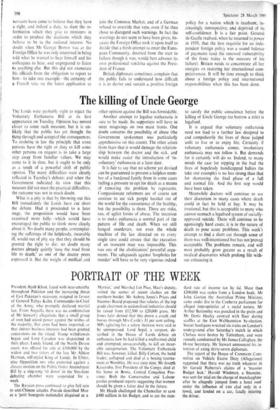The killing of Uncle George
The Lords were probably right to reject the Voluntary Euthanasia Bill at its first appearance on Tuesday. Opinion has moved closer to some such measure, but it is un- likely that the public has yet thought the thing through and accepted the consequences. To enshrine in law the principle that some persons have the right or duty to kill some other persons on request is to take a large step away from familiar values. We may come to it in time. but it ought to be only as a result of a powerful shift of public opinion. The many difficulties were clearly reflected in Tuesday's debate; and when the Government indicated its view that this measure did not meet the practical difficulties, the outcome was not in much doubt.
What is a pity is that by throwing out this Bill immediately the Lords have cut short the debate. Had it proceeded to a later stage, the proposition would have been examined more fully—which would have encouraged the public to think more clearly about it. No doubt many people, contemplat- ing the sufferings of the helplessly, incurably ill, would out of pity say that they should be granted the right to die; no doubt many doctors already quietly 'ease the road from life to death,' as one of the doctor peers expressed it. But the weight of medical and other opinion against the Bill was formidable.
Another attempt to legalise euthanasia is sure to be made. Its supporters will have to meet misgivings on two main fronts. One doubt concerns the possibility of abuse (the Government spokesman was particularly apprehensive on this count). The other arises from fears that it would damage the relation- ship between the doctor and the sick, and would make easier the introduction of 'in- voluntary' euthanasia at a later date.
It is fair to say that no scheme yet devised can be guaranteed to prevent a helpless mem- ber of a burdened family from in some cases feeling a pressure to opt for death as a means of removing the problem he represents. Compassionate reformers are of course not anxious to see sick people hustled out of the world for the convenience of the healthy, but the possibility is there. There are risks, too, of uglier forms of abuse. The intention is to make euthanasia a normal part of the pattern of life and death. When we still hanged murderers, not even the whole machine of the law directed on to every single case could ensure that the execution of an innocent man was impossible. This was one of the abolitionists' powerful argu- ments. The safeguards against 'loopholes for murder' will have to be very vigorous indeed to satisfy the public conscience before the killing of Uncle George (to borrow a title) is legalised.
It is argued that voluntary euthanasia need not lead to a further law designed to end compulsorily the lives of those judged unfit to live or to enjoy life. Certainly if voluntary euthanasia comes, involuntary euthanasia may not follow it. But demands for it certainly will do so. Indeed, to many minds the case for nipping in the bud the lives of hopelessly handicapped babies (to take one example) is no less strong than that for shortening the final phase of a full and normal life. And the first step would have been taken.
Meanwhile doctors will continue to use their discretion in many cases where death could in fact be held at bay. It may be irrational, but this is acceptable to many who cannot stomach a legalised system of socially- approved suicide. There will continue to be agonisingly hard cases; it is in the nature of death to pose acute problems. This week's attempt to find a short cut through some of them was well-intentioned but has not proved acceptable. The problems remain, and will most probably grow greater as a result of medical discoveries which prolong life with- out enhancing it.


































 Previous page
Previous page